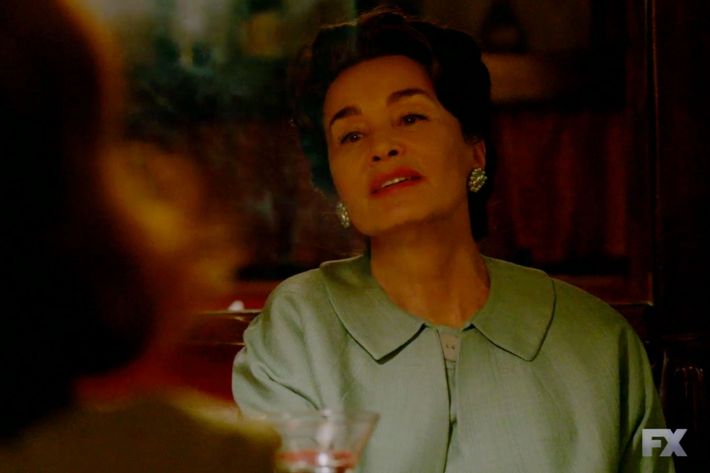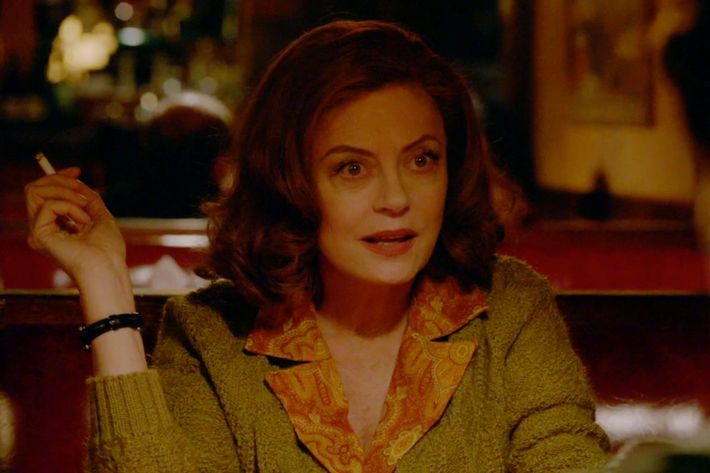
Halfway through her second autobiography, 1987’s This ’N That, actress Bette Davis addressed her so-called rivalry with fellow classic Hollywood legend Joan Crawford, writing, “Feud is a Hollywood word, a wildly overused Hollywood word. Did Bette Davis and Joan Crawford ever feud during the filming of [What Ever Happened to] Baby Jane? No.” It’s Bette’s words I’ve been thinking about while watching Ryan Murphy’s latest series, Feud, which tracks the behind-the-scenes drama between the actresses during the making of their only film together, the 1962 gothic horror classic What Ever Happened to Baby Jane? Thus far, Feud seems to exist in a nether realm between high camp and a sincere, layered portrait of womanhood, never fully meeting either goal — until episode three, which aired Sunday night. In “Mommie Dearest,” written by Tim Minear and directed by Gwyneth Horder-Payton, the show finds a way to balance these contradictory impulses in one scene, in which Bette and Joan simply talk over drinks, and finally come across as complex and human. This is Feud at its simplest and most poignant.
The scene comes roughly ten minutes into “Mommie Dearest.” Bette (Susan Sarandon) invites Joan (Jessica Lange) to knock back some drinks after another intense day on the set of Baby Jane. There is a lot riding on the success of this film for both actresses, who have seen their careers hit a snag thanks to the dramatic changes in the studio system, and the profound disinterest in creating roles that live up to the talents of women on the wrong side of 50. But Bette also has ulterior motives. Earlier, she asked Joan for parenting advice, given that Joan’s twin daughters act like “well-trained Pomeranians.” Bette ends up using Joan’s advice as a way to curtail any issues that may arise when she reveals that her own daughter, B.D. (Kiernan Shipka), will have a small role in their film. The scene is a fascinating tête-à-tête, where both women trade stories about motherhood and their own upbringings.
“Mommie Dearest” takes an interest in Bette and Joan’s roles as single mothers, and how their own mothers irrevocably warped their lives. As the conversation progresses, the women let their masks slip in imperceptible ways, revealing the wounds they carry with them. Bette considered her single mother, who sacrificed so much for her well-being, to be her only true female friend. This is only briefly mentioned, but it underscores the loneliness that comes with being such an ambitious, iconoclastic woman. Considering Bette’s mother died the year before, and she reached out to Robert Aldrich (Alfred Molina) in a previous episode when she needed a friend, it becomes obvious that relying on her mother so greatly has left a void in her life. Joan has a dimmer view on her own mother, who she describes as cruel and unloving; being sent to a harsh boarding school run by nuns was a welcome respite for her. Joan’s wounds in particular come into stark relief when she discusses her first sexual experience.
Bette was a late bloomer who didn’t have sex until her mid-20s, on her wedding night to her first husband. She laughs about this between snuffing out her cigarette and lighting another. But Joan’s story is no laughing matter. “You lost your cherry when you were 12?” an incredulous Bette asks. “Eleven,” Joan corrects her. It gets worse. Joan reveals she first had sex with her mother’s second husband, who she refers to as “Daddy Cassin.” “We weren’t blood related, so it wasn’t incest,” she says matter-of-factly. This isn’t the clumsy, too early sexual experiences of a preteen, but rape. Joan doesn’t see it that way. She says she led Cassin into it, and it was a welcome display of affection in the “desert” of her childhood. Bette’s face curdles into an expression somewhere between sorrow, pity, and disbelief. “You were just a child,” she says, wondering aloud why Joan’s mother didn’t kick the man out. On paper, this scene works, but thanks to the directing, and the performances by Sarandon and Lange, it feels blistering.
One of the first things I noticed was how simply director Horder-Payton approaches this scene. The cinematic grammar and over-the-top string score that define the directorial approach in the first two episodes are absent. This decision allows the differences between Bette and Joan to be framed by a sense of emotional realism, rather than camp excess. Bette drinks bourbon neat, Joan a Martini with a single olive. The production design of the bar mimics the warm, autumnal tones of Bette’s own home and wardrobe, making Joan — in her tailored mint dress and cool-toned ensemble — immediately stand out. Of course, none of this would make such an impression if it weren’t for the performances by Susan Sarandon and Jessica Lange.

I’ll be honest: I think it’s nearly impossible for any modern actor to properly play such legendary icons. But Sarandon and Lange come closest in this scene to making the gamble work. Lange may not have the fluidity of movement that makes Joan so entrancing, but I commend her for resisting the urge to turn the character into a Gorgon caricature cut from the same cloth as Faye Dunaway’s harsh take in Mommie Dearest. Sarandon nails Bette’s odd speech pattern, which can turn even kind words into a venomous one-liner, biting off consonants or drawing them out in a harsh staccato. Together, Lange and Sarandon find a comfortable rhythm in this scene that fleshes out some complex emotional truths about these characters.

Neither Bette nor Joan seems able to fully live in the moment. Joan has her eyes focused on the past. Just look at how Lange’s face goes soft, her eyes unfocused as if trained on some distant horizon when she speaks of “Daddy Cassin.” Hearing her story — and watching Lange’s face grow soft as she remembers her rapist as the only good thing about her childhood — reframes the way we view her relationships with the men in her life. When she calls Jack Warner (Stanley Tucci, having the most fun of his career) “Daddy,” or tries to seduce Aldrich when she feels threatened by the accolades Bette is racking up, it nods not only to her intense sexual appetite, but to the hunger for approval that defines her. Bette, meanwhile, is fixated on the future — the next role, the next award, the next challenge. While I have issues with how the rest of the series has framed women’s ambition, here, there is an interesting undercurrent. It’s obvious that Bette’s work as an actress is her center of gravity. It’s what gives her life meaning more than any man or romantic entanglement ever will. She thrives on the struggle that comes with wanting to create art in an industry where everything — especially fame and praise — is ephemeral.
“Look, we don’t have to be best pals, just allies. We both want the same thing: for this picture to be a success,” Bette says. She demurs when Joan says — with just a hint of haughty condescension — that Bette is a shoo-in for Best Actress at the next Academy Awards, thanks to her performance as Baby Jane. “See, even that was almost convincing,” Joan says, calling out Bette’s false modesty. Bette simply smiles in response. Over drinks, away from the manipulations of Warner and Aldrich, Bette and Joan are able to meet each other on the same level. By showing us this side of their dynamic, “Mommie Dearest” taps into what fuels the rivalry between them more than anything else: a desire to be the best.
Of course, in their minds, there’s only room for one on top. Watching Feud’s most recent episode, I thought of something Meryl Streep said about Bette in a Turner Classics Movies tribute: “Along with all the actresses of my generation, I am a direct beneficiary of Bette Davis’s will and determination. Because of her hard-fought achievements, we all had it a little easier.” This mix of grit and guile, which Bette and Joan both share, makes their disagreements downright volcanic and complex, rather than just a beautifully shot catfight. It’s these little details that help shift Feud from a somewhat engaging, frustrating show to one that has something meaningful to say about women’s ambitions.





